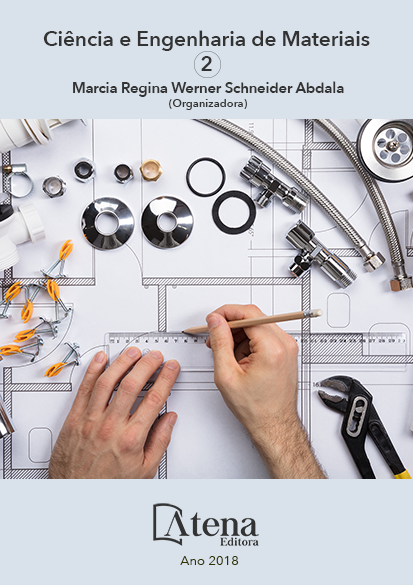
COMPORTAMENTO ESTRUTURAL DAS MATRIZES METÁLICAS DO SISTEMA Fe-Cu-Nb OBTIDAS POR PRENSAGEM A QUENTE
O presente trabalho tem como
objetivo estudar as ligas metálicas 56,66%Cu
– 28,33%Fe – 15%Nb; 50%Cu – 25%Fe –
25%Nb; 43,34%Cu – 21,67%Fe – 35%Nb e
36,33%Cu – 18,33%Fe – 45%Nb, observando
o comportamento da estrutura quando se
adiciona nióbio nas ligas, devido a possibilidade
de substituição de cobalto pelo nióbio em
matriz metálica para atuar como ligante em
ferramentas diamantadas. Os pós metálicos
foram misturados e então prensados a quente a
800°C/35MPa/3 min, ocorrendo a sinterização.
Realizaram-se nestes sinterizados difração de
raios X, microscopia eletrônica de varredura
e microanálise por espectroscopia dispersiva
de energia a fim de avaliar a microestrutura
resultante do processo de sinterização
das matrizes metálicas e a efetividade da
sinterização entre os elementos Fe, Cu e Nb.
Foi determinado também a densidade relativa,
a porosidade e a dureza HV5. Os resultados
mostraram que com o aumento do teor de nióbio
nas ligas metálicas há um favorecimento na
formação de soluções sólidas, o que implica na
melhora das propriedades mecânicas e físicas.
COMPORTAMENTO ESTRUTURAL DAS MATRIZES METÁLICAS DO SISTEMA Fe-Cu-Nb OBTIDAS POR PRENSAGEM A QUENTE
-
DOI: Atena
-
Palavras-chave: The present work aims to study the alloy Cu 56.66% - 28.33% Fe - 15% Nb; 50% Cu - 25% Fe - 25% Nb; Cu 43.34% - 21.67% Fe - 35% Nb and Cu 36.33% - 18.33% Fe - 45% Nb, observing the behavior of the structure when adding the niobium alloys, due to the possibility of substituting the cobalt by niobium in the metallic matrix to act as a binder for diamond tools. The metallic powders were mixed and then hot-pressed at 800 ° C / 35MPa / 3 min, sintering occurs. Were held in these sintered XRD, SEM and EDS to evaluate the microstructure resulting from the process of sintering metal matrix and the effectiveness of the sintering between Fe, Cu and Nb elements. Also it was determined the relative density, porosity and hardness HV5. The results showed that with the increase of the niobium content alloys there is a bias in the formation of solid solutions, which implies improved mechanical properties.
-
Keywords: The present work aims to study the alloy Cu 56.66% - 28.33% Fe - 15% Nb; 50% Cu - 25% Fe - 25% Nb; Cu 43.34% - 21.67% Fe - 35% Nb and Cu 36.33% - 18.33% Fe - 45% Nb, observing the behavior of the structure when adding the niobium alloys, due to the possibility of substituting the cobalt by niobium in the metallic matrix to act as a binder for diamond tools. The metallic powders were mixed and then hot-pressed at 800 ° C / 35MPa / 3 min, sintering occurs. Were held in these sintered XRD, SEM and EDS to evaluate the microstructure resulting from the process of sintering metal matrix and the effectiveness of the sintering between Fe, Cu and Nb elements. Also it was determined the relative density, porosity and hardness HV5. The results showed that with the increase of the niobium content alloys there is a bias in the formation of solid solutions, which implies improved mechanical properties.
-
Abstract:
The present work aims to study
the alloy Cu 56.66% - 28.33% Fe - 15% Nb;
50% Cu - 25% Fe - 25% Nb; Cu 43.34% -
21.67% Fe - 35% Nb and Cu 36.33% - 18.33%
Fe - 45% Nb, observing the behavior of the
structure when adding the niobium alloys, due
to the possibility of substituting the cobalt by
niobium in the metallic matrix to act as a binder
for diamond tools. The metallic powders were
mixed and then hot-pressed at 800 ° C / 35MPa
/ 3 min, sintering occurs. Were held in these
sintered XRD, SEM and EDS to evaluate the
microstructure resulting from the process of
sintering metal matrix and the effectiveness of
the sintering between Fe, Cu and Nb elements.
Also it was determined the relative density,
porosity and hardness HV5. The results showed
that with the increase of the niobium content
alloys there is a bias in the formation of solid
solutions, which implies improved mechanical
properties.
-
Número de páginas: 15
- Hellen Cristine Prata de Oliveira
- Marcello Filgueira


